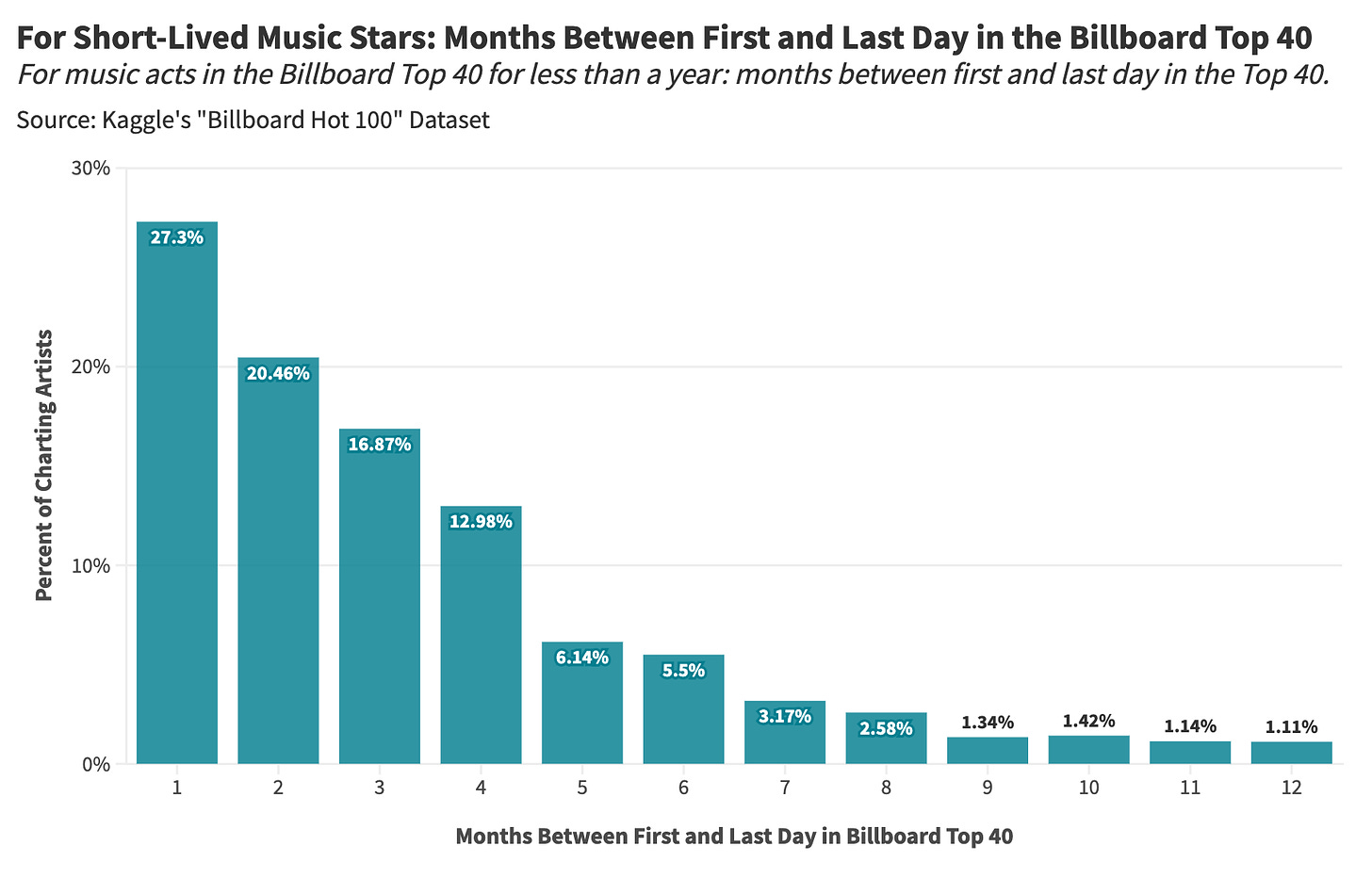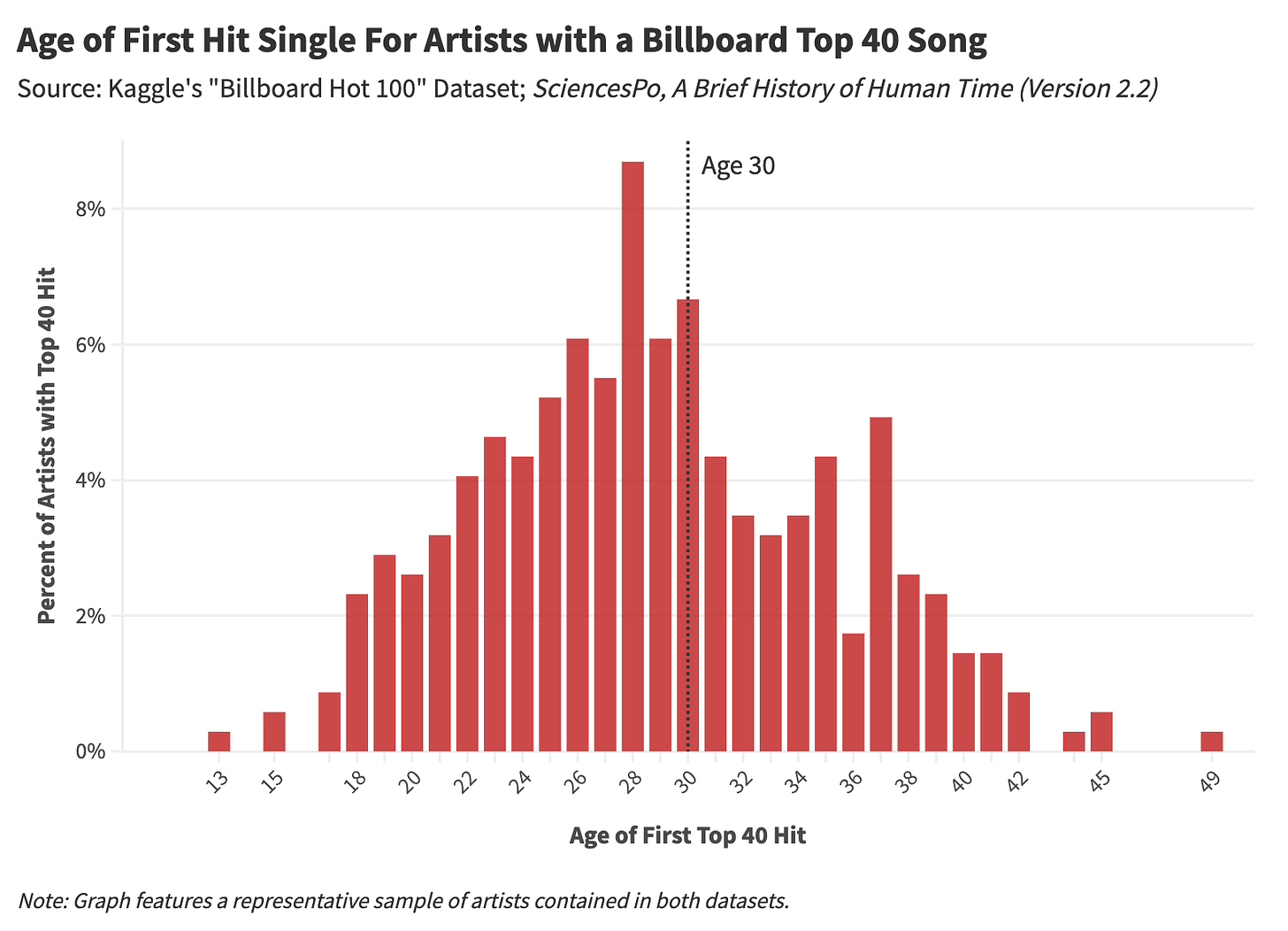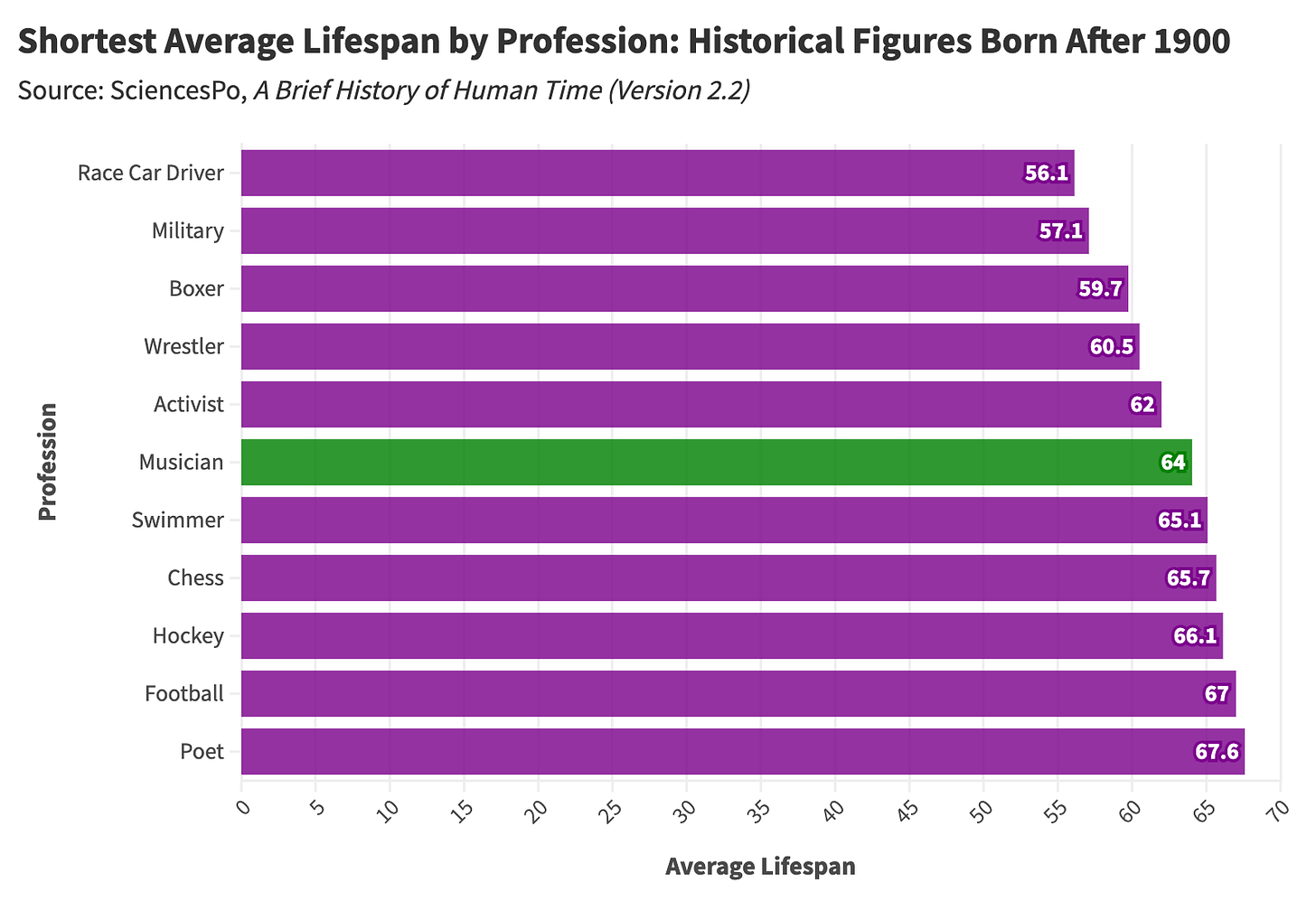- Stat Significant
- Posts
- How Long Does Music Stardom Last? A Statistical Analysis
How Long Does Music Stardom Last? A Statistical Analysis
When do music stars achieve fame, and how long does fame typically last?

Walk Hard: The Dewey Cox Story (2007). Credit: Sony Pictures.
Intro: Why are Music Biopics so Predictable?
The early 2000s saw a (rather unfortunate) surge in run-of-the-mill music biopics, with films like Ray, Walk the Line, and La Vie En Rose packaging the stories of beloved musicians into prestige Oscar bait. Despite their charm, most of these films adhere to a predictable formula, so much so that they were expertly spoofed in 2007's Walk Hard: The Dewey Cox Story—a forgotten gem I'd highly recommend. I haven't enjoyed a music biopic since watching Walk Hard, a film hellbent on identifying and satirizing the genre's myriad well-worn tropes, including (but not limited to):
Meteoric Success at an Early Age: Fourteen-year-old Dewey Cox (our fictional music star protagonist) improvises a song in the music studio that is played on the radio a mere 35 minutes after recording and instantly begins climbing the charts.
A Downfall Driven by Vice: Dewey falls victim to the temptations of sex and drugs, following a predictable progression of moral corruption. His drummer repeatedly introduces him to new narcotics, each time telling him, "You don't want none of this, Dewey Cox."
One Final Act of Redemption: After years of irrelevance, Dewey must craft a single masterpiece that encapsulates all his struggles, aiming to redeem himself and reclaim his legacy (stakes that the film blatantly articulates).
Despite Walk Hard's relentless mockery, these story conventions remain a staple of the music biopic, unabashedly regurgitated in films like 2019's Bohemian Rhapsody and Rocketman.
One curiosity I've always had about music biopics and the sameness of these stories concerns their source material: Does the trajectory of music celebrity follow such a predictable path that all dramatizations inevitably converge on the same narrative? What does the prototypical music career look like—in terms of rise and fall? Is music celebrity some short-lived curse incurred in early adulthood (as Hollywood films would lead us to believe)?
So today, we'll delve into the precarious longevity of music stardom. We'll examine when musicians achieve fame, how long they remain in the zeitgeist, and whether pop stardom is inherently hazardous.

Mostly Metrics is a weekly business newsletter that goes out to +50,000 startup operators, VCs, and CFOs. It's full of business insights you can actually understand. CJ, a startup CFO, breaks down financial metrics, monetization models, and topics like dilution and fundraising...all in plain English.
How Long Does Music Stardom Last?
Four-year-old Jordy Lemoine burst onto the French music scene in 1992 with his novelty hit "Dur dur d'être bébé! (It's Tough to Be a Baby)." This catchy pop song about the tribulations of being a baby topped the European charts and cracked The Billboard Hot 100—earning Jordy a Guinness World Record as the youngest singer ever to have a No. 1 charting single.

“Dur dur d'être bébé!” music video. Credit: Columbia Records.
Unsurprisingly, four-year-old Jordy's music career quickly faded after his bizarro smash hit, with subsequent releases failing to match the popularity of his early work (you know, when he was a toddler). Today, Jordy is a pop culture curio, occasionally appearing on French reality TV, working behind the scenes in the music industry, and serving as fodder for bar trivia questions worldwide.
While aspects of Jordy's ascension are unique—like achieving notoriety while still having baby teeth—his fleeting stardom is remarkably common. When examining the span between an artist's first and last day in the Billboard Top 40 (over their entire career), most acts achieve mainstream recognition for less than a single year.

Two years ago, Elton John's 2022 hit "Cold Heart" reached #7 on the Hot 100, fifty years after his first charting song, "Rocket Man," peaked at #20—marking the longest timespan between an artist's first and last Top 40 hit. Artists like Elton John, Cher, Santana, and Bruce Springsteen are among the elite 1% of music stars who have maintained cultural recognition for over two decades. These careers are exceptional mega-outliers, as music celebrity is typically confined to one hit album or single.
The prototypical Top 40 music career looks more like Of Monsters And Men, the quirky Icelandic folk band whose hit single "Little Talks" graced the charts for a fleeting four months in 2012. For 112 days, "Little Talks" was inescapable before promptly fading from the mainstream, along with Of Monsters and Men. If you're reading this and thinking to yourself, "What's Of Monsters And Men?" then you've proven my point. Furthermore, if you google the song "Little Talks," you'll immediately recognize this once-pervasive earworm—further proving my point.
Of Monsters and Men has enjoyed continued success since their 2012 breakout, with new singles reaching the Icelandic charts and Billboard's US Hot Rock 100, but none have matched the impact of their initial success. Indeed, most bands with less than a one-year stay in the Top 40 maintain their foothold for under four months.

This data paints a rather bleak portrait of music celebrity: those who reach the top of the mountain achieve global recognition for a few months and then (most likely) never again. In some ways, this brief moment of glory feels like a Faustian curse—to achieve star status, fulfilling a childhood dream, only to have it slip away. What, then, is the prototypical life of a music star, and do these fleeting moments of fame have discernible repercussions?
The Prototypical Life of a Music Star
In 1981, rock band Tommy Tutone released a song called "867-5309/Jenny," an infectious power pop tune about a man who finds a woman's phone number written on a bathroom wall and considers calling her, wondering if she might be the girl of his dreams. The song's chorus proved infectious, and the single became an instant hit, reaching #4 on the Billboard Charts. The popularity of "867-5309" led to a wave of people dialing the titular digits, causing such a disturbance that phone companies eventually stopped assigning the number altogether.

“867-5309” music video. Credit: Columbia Records.
As for Tommy Tutone, the band struggled to recapture the success of "867-5309." Their subsequent albums and singles failed to match the popularity of their mega-hit, and the band disbanded in the mid-1980s. After some unsuccessful solo projects, the band's lead singer, Tommy Heath, ended his music career and moved to Oregon, where he began his second life as a computer programmer. One day, Tommy Heath had a single on the Billboard Charts; a decade later, he was writing computer code (and potentially living a more fulfilling life). Much like Heath, many musicians experience early stardom only to flame out and transition to an entirely different career.
Pete Townshend of The Who once remarked that "Rock 'n' roll is a young man's game"—a sentiment that broadly applies to all Top 40 music. Stardom tends to skew younger, with emerging music acts crafting hits for youthful audiences eager to digest the latest trends.
When we examine artists' ages at the time of their first Top 40 hit, we find that most musicians achieve this milestone before turning 30.

So, to recap, stardom is typically achieved young, usually in an artist's twenties, and then dissipates within a year (often within three to four months). What a brutal career.
Perhaps the stereotype of the tortured artist is more truthful than we care to admit. Consider the "27 Club," a phenomenon that refers to a group of influential musicians who tragically died at the age of 27, often due to drug and alcohol abuse. Some of the most notable figures from this "club" include music legends like Jimi Hendrix, Janis Joplin, Jim Morrison, Kurt Cobain, and Amy Winehouse. Sure, many of these artists died at the height of their fame, having yet to relinquish the spotlight, though aspects of their deaths are often attributed to the pressures and challenges of music stardom early in life.
To further explore the precarity of music celebrity we'll utilize "A cross-verified database of notable people, 3500BC-2018AD," a comprehensive dataset of every "prominent" individual in human history. This expansive database, curated by a global team of six economists (using Wikipedia data and in the name of science!), encapsulates hundreds of thousands of historical figures and serves as a fascinating repository of birth and death dates, countries of origin, and professional occupations.
Using this "cross-verified database," we find that music stars have one of the shortest lifespans of any profession, with an expectancy comparable to boxers, military figures, and race car drivers.

To be famous is hard, and to stay famous is also hard. Perhaps fame, in general, is a cosmic curse.
Final Thoughts: Why Do People Aspire to Music Stardom?

Back to Black (2024). Credit: Focus Features.
Is it worse to achieve music stardom and lose it, or to never achieve your dream at all?
Our sense of self is shaped by the stories we construct about our lives, including imagined scenarios—how our life might have unfolded had we gone down an alternative path. This psychological phenomenon is often referred to as "counterfactual thinking" or "comparative narratives theory."
Consider my dependence on coffee, for instance, a habit cultivated due to a random Starbucks order I made when I was 20 years old—a single choice that provides me with a discernible counterfactual: would my life be better if I had never been introduced to coffee at all? This habit is not without cost: I can't start my day without caffeine, a chemical compound that often makes me anxious and jittery for a few hours. At the same time, I now understand what it's like to consume this drink—the perceived cognitive benefits and mood boost of its consumption—and I will never not possess this knowledge. I live in a post-coffee world.
We can think of music stardom in similar terms: is a music career better with or without the attainment of celebrity? Which one of these outcomes is worse:
Having a Top 40 Hit: Is it better to know the thrill of mainstream success for a fleeting three months and never again? Once you know the joy of cultural recognition, do you chase that feeling for the rest of your life or pick yourself up and move on?
Not Having a Top 40 Hit: Perhaps you dreamed of music stardom when you were a little kid—and this dream propelled you through guitar and voice lessons. Unfortunately, you will not accomplish this dream, but you'll also never feel the sting of achieving this milestone and having it slip away.
Throughout this analysis, I couldn't help but wonder why anyone would aspire to become a mainstream music star—to achieve professional success that bears a near-immediate expiration date. The entertainment industry thrives on a tournament-style labor model—a winner-take-all system where participants vie for a limited number of top positions or rewards. Creating a song that reaches the Top 40 is statistically improbable; to sustain this renown for over a year is even more unlikely. But apparently, the most improbable of outcomes is somehow worth the heartache.
Regret minimization, a concept in decision theory, posits that people often make decisions to avoid future regret. This aversion can drive individuals to pursue seemingly impossible dreams, such as music stardom, to prevent the regret of never trying. The fear of looking back and wondering "what if" is a powerful motivator, pushing people to chase elusive success.
Maybe the allure of pop stardom and the fear of future regret are simply too strong, or perhaps turning a passion into a career is worth the struggle. Once bitten, this concept is difficult to shake—just like a coffee addiction. Unlike Ray Charles, Johnny Cash, and Dewey Cox, there is (likely) no final redemptive act—no blaze of glory that makes it all worthwhile. And yet we do it anyway; statistics be damned.
Thanks for reading Stat Significant! Subscribe for free to receive new posts and support my work.
Want to chat about data and statistics? Have an interesting data project? Just want to say hi? Email [email protected]